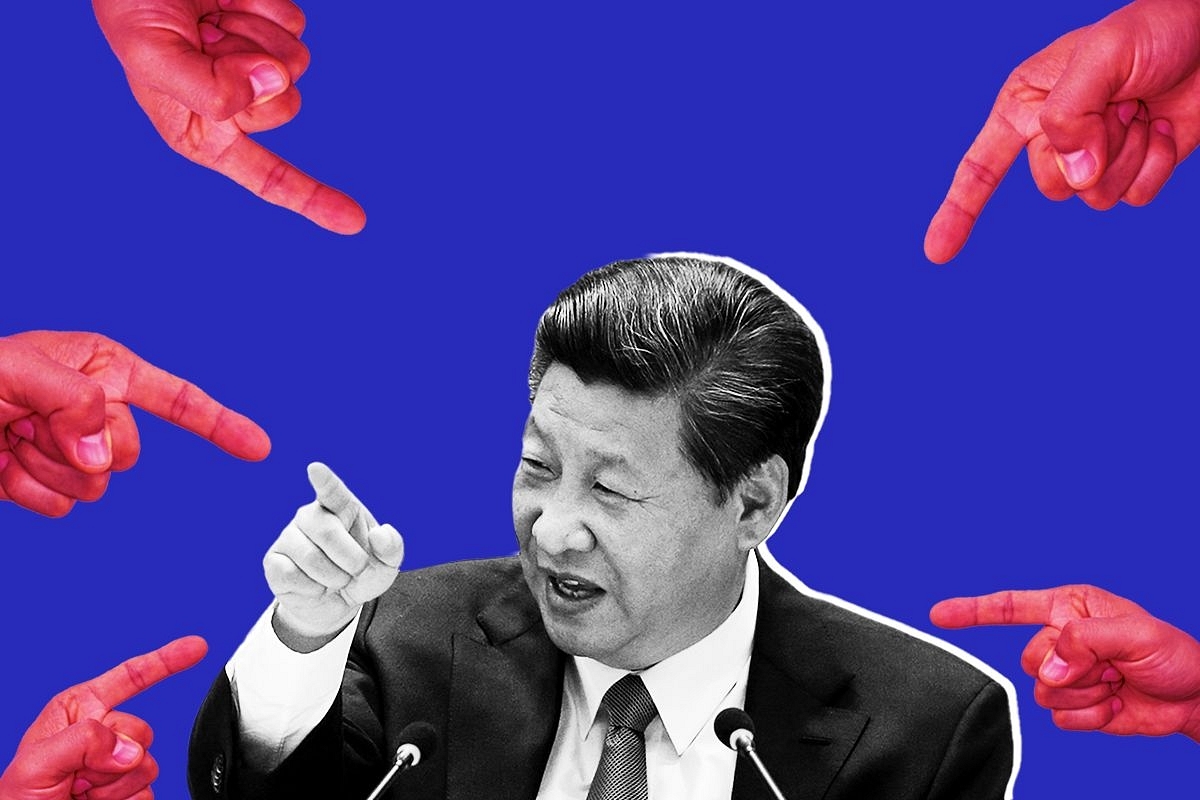Context
Chinese Espionage Links Uncovered In India While Probing Money Laundering

China's President Xi Jinping
Recent evidence suggests that Chinese corporations are being used as arms of the Chinese state for espionage.
Money laundering allegations: The Chinese mobile manufacturer Vivo is being investigated by the ED in a money laundering case.
A total of 44 locations have been raided by the ED under the provisions of the Prevention of Money Laundering Act.
The ED has already passed an order freezing Xiaomi India's bank assets worth over Rs 5,500 crore.
The espionage angle: The Union government has been busting spy rings, studying incoming Chinese investments into India, carrying out tax raids on major Chinese telecom companies, and cracking down on Chinese mobile apps since 2020.
Raids have been carried out on firms like ZTE and Huawei, apart from Vivo and Xiaomi.
The availability of cheap and even underpriced products from these firms has given them significant market share in India.
Several Chinese companies are being probed for profiling 'high value' individuals, exfiltrating bulk data, and engaging in large-scale tax evasion.
Their goal seems to be to gain a strategic advantage over India's economic and security systems.
There are hundreds of small Chinese companies, a web controlled by Chinese nationals with dummy Indian directors and managers, to provide a veil of legitimacy, an Economic Times (ET) report says.
A probe by the Registrar of Companies revealed that these companies did not physically exist at their registered offices, although the bank accounts were active. They were being operated from abroad.
According to the ET report, "The web of these companies is believed to have laundered over Rs 1,000 crore, with some of the proceeds used to gather intelligence in India."
Influencing Tibetans: One such company was used to influence Tibetan monks living in India.
Luo Sang, a Chinese national, was arrested in 2020. He was sending money in packets to Tibetan monks.
The Government of India suspects that the money was provided to Tibetan monks to gather information about the Dalai Lama and the Tibetan government-in-exile.
Findings: It was found that senior employees of some of these companies are members of the Chinese Communist Party.
In one case, it was discovered that the CEO of a major telecom firm possessed sensitive documents.
In another, a deep profile of an Indian business leader of interest to China was discovered.
Chinese-origin mobile phones were found to have a seamless data link with China.
Indians' data collected via these devices, such as fingerprints and selfies, has helped China acquire biometric details of millions of Indians.
The US a target too: The FBI describes China’s intelligence activities as “the greatest long-term threat.”
An assessment by the Carnegie Endowment for International Peace said: "China’s intelligence agencies have stolen a significant volume of U.S. military secrets in recent years, including aircraft designs. They have penetrated U.S. political campaigns to gain insight into future American policymaking. And they have compromised America’s own espionage networks, reportedly helping to expose and disrupt U.S. intelligence activities in China — a top American collection priority — and elsewhere."
Reports by FT suggest that China has been relying on research students in American universities to gain access to research in critical areas such as biotechnology, soil science, quantum computing, and artificial intelligence.
It was found that China has been using graduate school students to target the Physics Department of Johns Hopkins University.
What the FBI says: The FBI's assessment is that the Chinese are targeting companies producing proprietary rice and corn seeds to software for wind turbines to high-end medical devices, and not just targeting innovation and R&D.
The Chinese are going after cost and pricing information, internal strategy documents, bulk PII — anything that can give them a competitive advantage.
Large Chinese businesses are state-owned enterprises. Even where not formally owned, they are legally and practically beholden to the government in a tangible way.
China has national security laws that compel Chinese companies to provide the government with information and access at their government’s request.
And virtually all Chinese companies of any size are required to have Communist Party “cells” inside them to make sure that the companies stay in line with the party’s principles and policies.
New-age warfare has shifted from the physical battlefields to the virtual world. Countries would do well to guard themselves against espionage and establish sufficient protection against cyber attacks. More scrutiny on Chinese activities will help.
Support Swarajya's 50 Ground Reports Project & Sponsor A Story
Every general election Swarajya does a 50 ground reports project.
Aimed only at serious readers and those who appreciate the nuances of political undercurrents, the project provides a sense of India's electoral landscape. As you know, these reports are produced after considerable investment of travel, time and effort on the ground.
This time too we've kicked off the project in style and have covered over 30 constituencies already. If you're someone who appreciates such work and have enjoyed our coverage please consider sponsoring a ground report for just Rs 2999 to Rs 19,999 - it goes a long way in helping us produce more quality reportage.
You can also back this project by becoming a subscriber for as little as Rs 999 - so do click on this links and choose a plan that suits you and back us.
Click below to contribute.
Latest